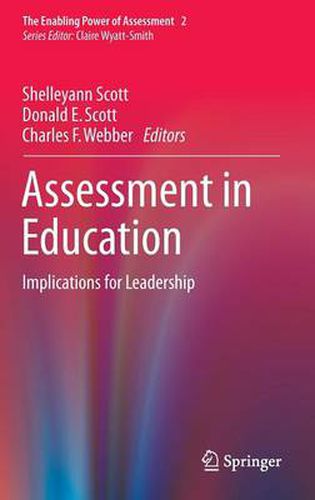Readings Newsletter
Become a Readings Member to make your shopping experience even easier.
Sign in or sign up for free!
You’re not far away from qualifying for FREE standard shipping within Australia
You’ve qualified for FREE standard shipping within Australia
The cart is loading…






This title is printed to order. This book may have been self-published. If so, we cannot guarantee the quality of the content. In the main most books will have gone through the editing process however some may not. We therefore suggest that you be aware of this before ordering this book. If in doubt check either the author or publisher’s details as we are unable to accept any returns unless they are faulty. Please contact us if you have any questions.
This book provides key insights into how educational leaders can successfully navigate the turbulence of political debate surrounding leading student assessment and professionalised practice. Given the highly politicised nature of assessment, it addresses leaders and aspiring leaders who are open to being challenged, willing to explore controversy, and capable of engaging in informed critical discourse.
The book presents the macro concepts that these audiences must have to guide optimal assessment policy and practice. Collectively, the chapters highlight important assessment purposes and models, including intended and unintended effects of assessment in a globalised context.
The book provides opportunities to explore cultural similarities and particularities. It invites readers to challenge taken-for-granted assumptions about ourselves and colleagues in other settings. The chapters highlight the cultural clashes that may occur when cross-cultural borrowing of assessment strategies, policies, and tools takes place. However, authors also encourage sophisticated critical analyses of potential lessons that may be drawn from other contexts and systems.
Readers will encounter challenges from authors to deconstruct their assessment values, beliefs, and preconceptions. Indeed, one purpose of the book is to destabilise certainties about assessment that prevail and to embrace the assessment possibilities that can emerge from cognitive dissonance.
$9.00 standard shipping within Australia
FREE standard shipping within Australia for orders over $100.00
Express & International shipping calculated at checkout
This title is printed to order. This book may have been self-published. If so, we cannot guarantee the quality of the content. In the main most books will have gone through the editing process however some may not. We therefore suggest that you be aware of this before ordering this book. If in doubt check either the author or publisher’s details as we are unable to accept any returns unless they are faulty. Please contact us if you have any questions.
This book provides key insights into how educational leaders can successfully navigate the turbulence of political debate surrounding leading student assessment and professionalised practice. Given the highly politicised nature of assessment, it addresses leaders and aspiring leaders who are open to being challenged, willing to explore controversy, and capable of engaging in informed critical discourse.
The book presents the macro concepts that these audiences must have to guide optimal assessment policy and practice. Collectively, the chapters highlight important assessment purposes and models, including intended and unintended effects of assessment in a globalised context.
The book provides opportunities to explore cultural similarities and particularities. It invites readers to challenge taken-for-granted assumptions about ourselves and colleagues in other settings. The chapters highlight the cultural clashes that may occur when cross-cultural borrowing of assessment strategies, policies, and tools takes place. However, authors also encourage sophisticated critical analyses of potential lessons that may be drawn from other contexts and systems.
Readers will encounter challenges from authors to deconstruct their assessment values, beliefs, and preconceptions. Indeed, one purpose of the book is to destabilise certainties about assessment that prevail and to embrace the assessment possibilities that can emerge from cognitive dissonance.